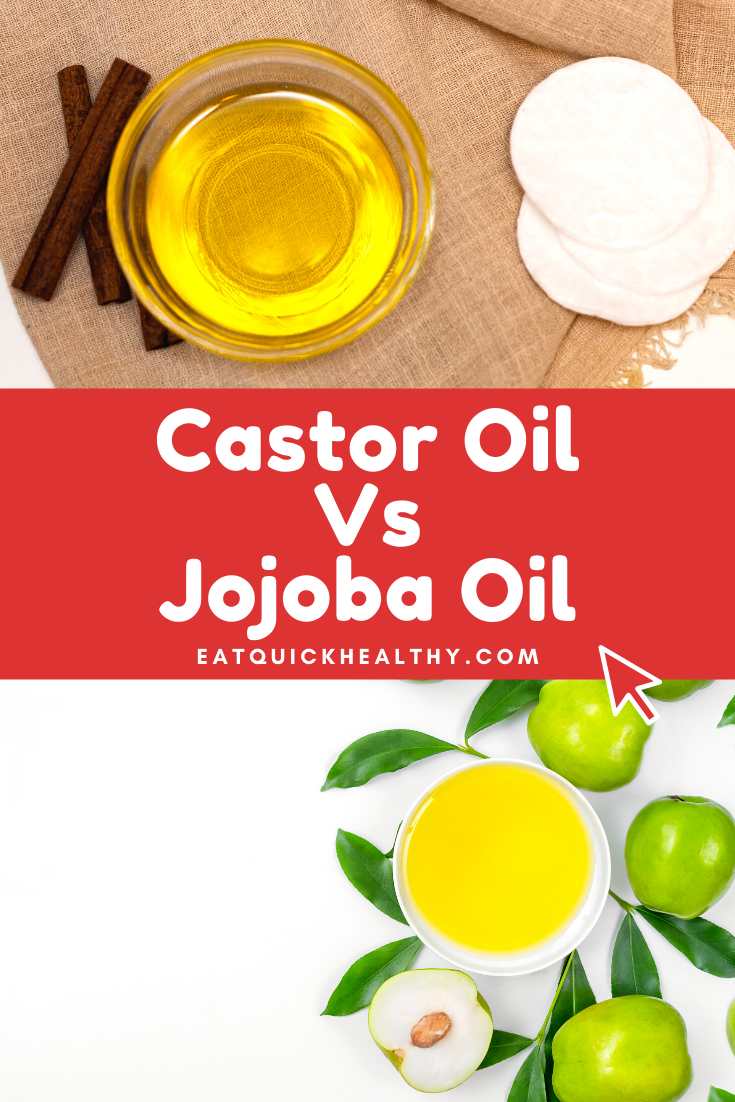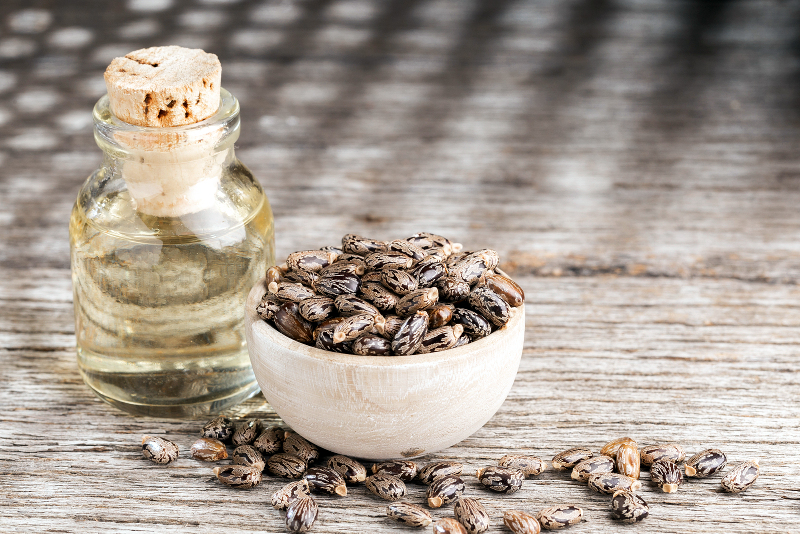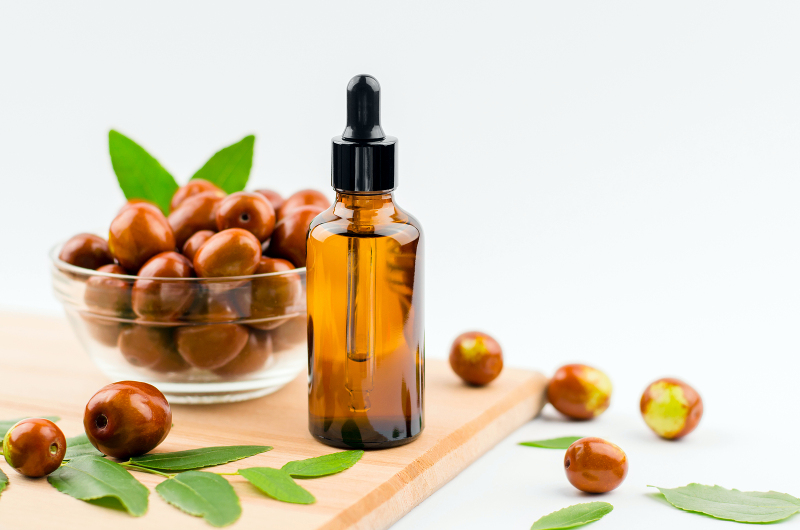So you’re looking for a moisturizer for your skin and hair. Chances are, you’ve heard of all these great oils, but your are overwhelmed and aren’t sure where to look.
Which is better? Castor oil or jojoba oil? Are they both safe to use? Which will get you better results?
We’ll dive deeper into the answer in this article, but the reality is that both oils are great. You simply need to decide which oil is best for you and your body.
Below, I cover the benefits of each oil, their similarities and differences and whether you can use both together.

What Is Castor Oil?
Castor oil is a vegetable oil that comes from the seed of the castor bean plant. The castor bean plant grows natively in Eastern Africa, the Mediterranean Basin, and parts of Asia. The beans are cold pressed to extract the oil.
The oil is very popular all across the world and has been used for thousands of years. Long ago, people discovered how castor oil is able to treat digestive problems, as well as heal and moisturize skin.

Benefits Of Castor Oil
Castor oil is an amazing product that can work wonders on your skin and your hair. Here are some of the best things that castor oil can provide:
- It moisturizes the skin
- The oil is very thick, easily penetrating the skin
- It also pulls moisture straight from the air around you
- It treats acne and infections
- It is made up of 90% ricinoleic acid, a fatty acid that treats inflammation
- It also has antibacterial properties to clear infections
- It is non-comedogenic and does not clog pores
- It improves the strength and appearance of hair
- It increases circulation in the scalp, allowing your hair follicles to receive more nutrients
- It locks in moisture to make hair softer and smoother
- It treats itchiness, swelling, and infection caused by dandruff
- It treats occasional constipation
- The oil is very lubricating
- It causes muscle contractions to move things along
To learn more about the amazing properties of castor oil, check out our article on skin, and our article on hair.
What Is Jojoba Oil?
Jojoba oil, or Simmondsia chinensis, is a vegetable oil produced from a shrub that is natively found in Argentina and Mexico. The shrub is very resilient and impressive as it can grow up to 13 feet in height, and can live for up to 100 years.
Jojoba oil is derived from the seed through drying. The seeds of the jojoba plant are about the size of an olive, and about 50% of the weight of the seed comes from the oil alone.
The oil has a wax-like composition, and 98% of the oil is made up of esters which are made from fatty acids and fatty alcohols.
Just keep in mind that if you want to use jojoba oil, it is best kept at room temperature. If you keep it in temperatures below 59 degrees Fahrenheit, the oil will harden into a solid. Jojoba oil is still useable as a solid, but you will need to melt it back down to a liquid, first.

Benefits Of Jojoba Oil
Similar to castor oil, jojoba oil has a lot of great uses to get your body feeling and looking healthy.
It’s A Moisturizer
Jojoba oil is great for moisturizing the skin because it easily penetrates the surface of the skin and can stay within the skin for a long time.
The oil is also rich in ceramides which hydrate your skin cells and keep them moisturized for longer. Not only do ceramides help your skin become moisturized, but it also protects your skin from dirt, pollution, and bacteria.
As I said previously, 98% of the oil consists of wax esters which make it much easier for the skin to heal and repair itself. This makes it incredibly useful to treat skin conditions like dermatitis and eczema.
It Improves Skin Tone
Not only will jojoba oil help your skin to become more moisturized and healthier, but it can help reverse the appearance of aging. As we get older, we sometimes become self-conscious of our aging bodies. We develop age spots under our eyes and over the rest of our bodies.
Jojoba oil doesn’t just moisturize the skin, but it also helps to heal damaged skin cells. When damaged skin cells are repaired and replaced with new, healthy skin cells, our skin takes on a more natural appearance. You will begin to notice the fading, and possibly the disappearance of, age spots.
It Has Anti-Inflammatory Properties
Another great thing about jojoba oil is that it has anti-inflammatory properties that can help your skin feel and look healthier. People with certain skin conditions — like rashes, eczema, or infections — often deal with skin that is red, itchy, and swollen.
Jojoba oil will help to treat the underlying problems causing these conditions, and it will help relieve the symptoms. People who use jojoba oil on their skin find that their swelling and redness goes down, bringing them unbelievable relief.
Likewise, jojoba oil is a very popular product to use as an aftershave. The anti-inflammatory properties help prevent the swelling and itching associated with razor burn. Instead, it leaves the skin feeling and looking smooth.
It Can Treat Acne & Infection
Because jojoba oil has anti-inflammatory properties, it’s also very effective at treating acne. The oil can relieve any swelling and pain caused by the acne, helping you to feel better.
Not only will the oil reduce the redness and swelling caused by acne, but it can treat acne at the source. Acne is created when bacteria seeps into your pores. Jojoba has anti-bacterial properties that help it to fight against infection, treating existing acne, and preventing acne from forming in the future.
It Protects Against Sunburn
Of course, sunscreen should always be used as the first defense against sunburn when going outside. However, if you’re not going to be out for a long time, jojoba oil can act as a protectant against the harsh rays of the sun. In fact, jojoba is an ingredient that is commonly found in sunscreens.
If you forgot to put on sunscreen and now your skin is red, painful, and peeling, don’t worry. Jojoba oil will work to help repair your damaged skin.
The oil has a waxy-texture, it works like a shield to protect your skin. It will reintroduce moisture and help heal the damaged skin cells. It will also protect your skin cells from any further damage and breaking.
It Improves The Health & Appearance Of Hair
Just as jojoba oil can easily moisturize your skin, it can also moisturize and condition your hair. The oil sinks deep into your scalp where it can penetrate your skin as well as the cuticles of your hair. There, it is able to lock in moisture and provide your hair with important nutrients.
Besides making your hair look and feel healthier, jojoba oil can help cure dandruff as well. The moisturizing, anti-inflammatory, and antibacterial properties of the oil sink deep within the skin to heal your dry scalp, prevent infection, and prevent flaking.
Castor Oil Vs Jojoba Oil
So which is better, castor oil or jojoba oil? Well, it really depends on what your preferences are and what you’re looking to achieve for your body. The two oils have many similarities, although they are a bit different as well.
Similarities Between Castor Oil And Jojoba Oil
- Both oils are great moisturizers
- Both oils can help repair and strengthen hair
- Both oils can treat acne
- Both oils can treat dandruff
- Both oils can fight infection
- Both oils can fight inflammation
- Both oils can improve the appearance of skin
What Are The Differences Between Castor And Jojoba Oil?
Although jojoba and castor oil have a lot of things in common, they have some difference as well. Even when they accomplish the same things, they often do so in a different manor.
- Moisturizers
- Jojoba oil has emollient properties that makes the skin soft and smooth
- Castor oil is a humectant, meaning that it seals moisture into the skin
- Castor oil is also thicker and is more easily able to penetrate the skin
- Castor oil also takes moisture from the air around us and transfers it to our skin
- Antibacterial Properties
- Jojoba oil is very effective in treating acne and dandruff, so it is thought to have antibacterial properties along with its anti-inflammatory properties
- Castor oil is made up of about 90% recinoleic acid — a fatty acid that has natural antibacterial properties
- Castor oil can treat dandruff, acne, and athlete’s foot, among others
- Castor oil is likely significantly more effective at treating infections than jojoba oil
- Treating Skin Conditions
- Castor oil is incredibly moisturizing and can help heal dry skin, including dermatitis
- Castor oil is very potent in its pure form and is more likely to cause skin irritation
- Because of its potent properties, it’s not recommended to use castor oil if you have eczema
- Jojoba oil is also incredibly moisturizing and contains many of the same healing properties that castor oil does
- Jojoba oil is not as potent or as irritating to skin as castor oil
- Jojoba oil is safe to use on skin prone to eczema
- Castor oil is incredibly moisturizing and can help heal dry skin, including dermatitis
Castor Oil Vs Jojoba Oil For Hair
Really, when it comes to hair, jojoba and castor oil are just about neck and neck. They will both work to make your hair stronger, healthier, and better looking in appearance.
Castor Oil And Jojoba Oil For Face
Both jojoba and castor oil are great for your face, whether you’re using them as a cleanser or a moisturizer. However, I believe that castor oil is slightly better.
Castor oil is going to be better at cleansing your skin and getting rid of acne. The oil is thick and easily grabs onto dirt and bacteria to whisk it away.
Not only that, but castor oil is less likely to clog your skin. Castor oil is completely non-comedogenic with a comedogenic rating of 0. Jojoba oil, on the other hand, has a rating of 2. While jojoba oil’s rating is still very low, when it comes down to it, it’s more likely to clog your pores than castor oil.
Castor Oil Vs Jojoba Oil For Skin
Which oil is better for your skin really depends on what you’re trying to achieve. Jojoba oil is better for sensitive skin, and it can be useful if you’re dealing with a skin condition like eczema which you can’t use castor oil for.
On the other hand, if you’re seeking a longer-lasting and more hydrating moisture, then you should go for castor oil.
Price
To find out the differences in prices,
Can You Use A Castor Oil Jojoba Oil Mix?
Castor oil mixed with jojoba oil is a great combination!
Of course, you can use jojoba oil or castor oil alone, but they work even better when used together! Dry skin loves jojoba and castor oil, so if you deal with dry, itchy, or irritated skin, try a combination of the two oils.
Whether you’re using castor oil and jojoba oil for hair, a castor oil and jojoba oil mix for face, or castor and jojoba oil for skin… The two oils always work better together!
[mv_create key=”40″ type=”recipe” title=”Jojoba & Castor Oil For Dry Skin” thumbnail=”null”]
Once done, you can massage the oil mixture into your skin. It is best to use your fingers, massaging in a circular motion. Leave the mixture on for at least 1 hour, then rinse it off. You can even leave it on overnight and simply rinse it off in the morning.
[mv_create key=”41″ type=”recipe” title=”Castor And Jojoba Oil For Hair” thumbnail=”null”]
You can then massage the oil into your scalp with your fingers. Allow the mask to stay in your hair for at least half an hour. You can also sleep with the mask on overnight and just rinse your hair in the morning.
Conclusion
So which is best out of castor and jojoba oil? It really depends on what you are using the oil for and your personal preferences.
When choosing which oil you’re using, it’s important to know what you’re using it for. If you have extremely sensitive skin, it might be a better idea to go with jojoba oil. Jojoba oil is backed by lots of scientific research. There has been some research done on castor oil, but the results are not as sound as those found with jojoba oil.
However, for those looking for a deeper moisturizer, castor oil is likely your go-to product. It is better able to lock in moisture than jojoba oil, and it can treat various skin problems and infections.
The bottom line is, jojoba and castor oil are both great products. Simply pick whichever is going to be best for your skin.
Learn more about castor oil in our guides here including its benefits for facials here. Also read more about jojoba oil for hyperpigmentation, if it clogs your pores or not here and more jojoba oil guides here.



Comments are closed.